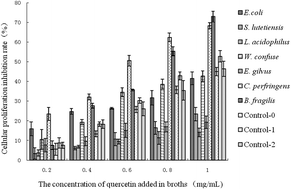Part of quercetin is coerced into the colon after ingestion and interacts with the gut microbiota. The interaction between quercetin and gut microbiota will influence human health. The cytotoxicity of quercetin and its metabolites from human gut bacteria in vitro fermentation was investigated in this study. The 3-(4,5-dimethylthiazol-2-yl)-2,5-diphenyltetrazoliumbromide) (MTT) and agar diffusion disc methods were individually applied in vitro to examine their inhibitory effect on three cultured human cancer cells and five pathogenic bacteria species. The results showed that the metabolites from Clostridium perfringens and Bacteroides fragilis exerted a strong inhibitory effect (P < 0.05) on HCT-116 cells and that of Weissella confusa was stronger (P < 0.01) on both A549 cells and HeLa cells than on the others. Most metabolites have similar or decreased inhibitory ability on human cancer cells compared to quercetin itself. This inhibitory effect had not been detected in quercetin and its metabolites in five common pathogenic bacteria species. Quercetin is a potential chemopreventive agent. However, this study reported that some gut bacteria can improve their function of inhibiting cancer cells after fermenting quercetin.

